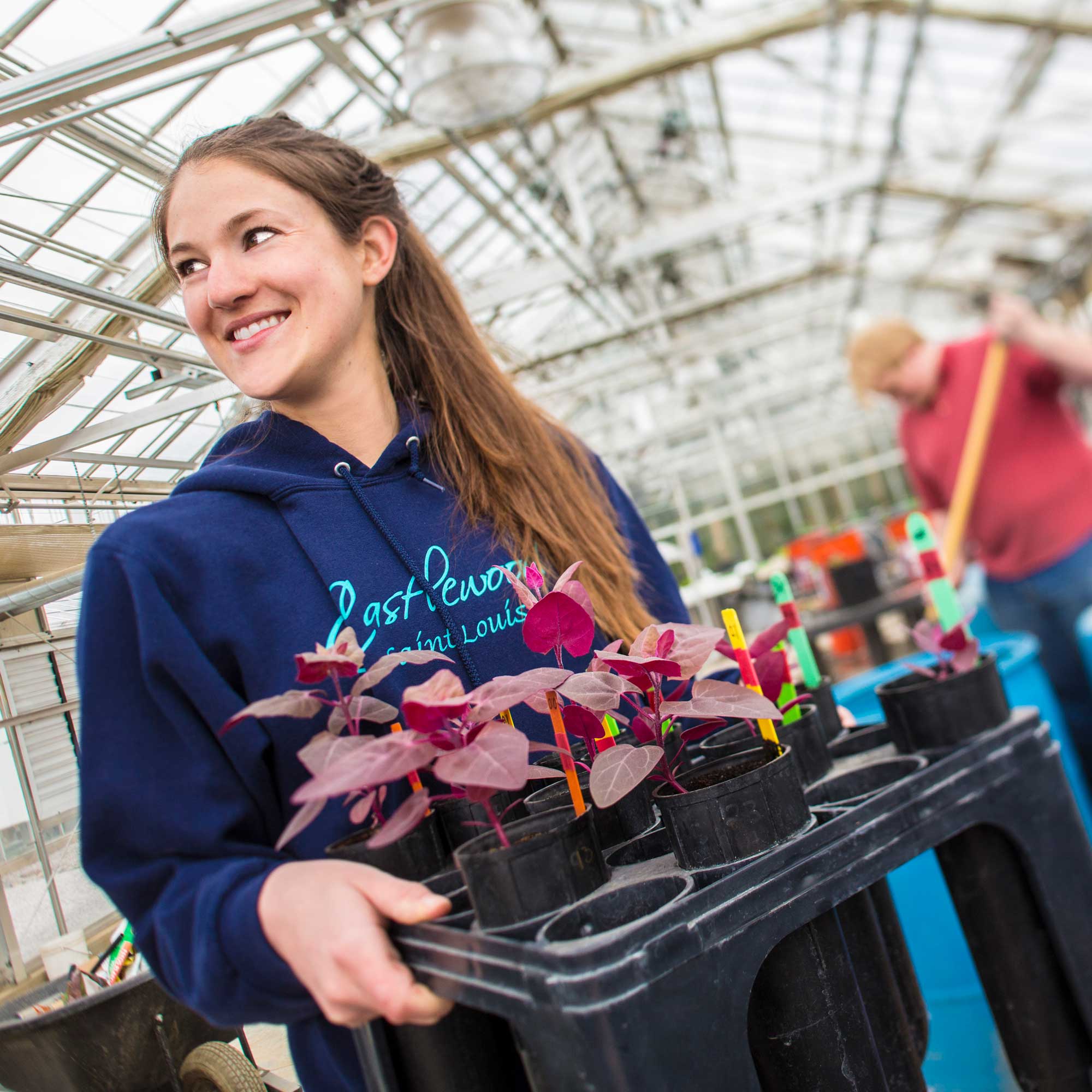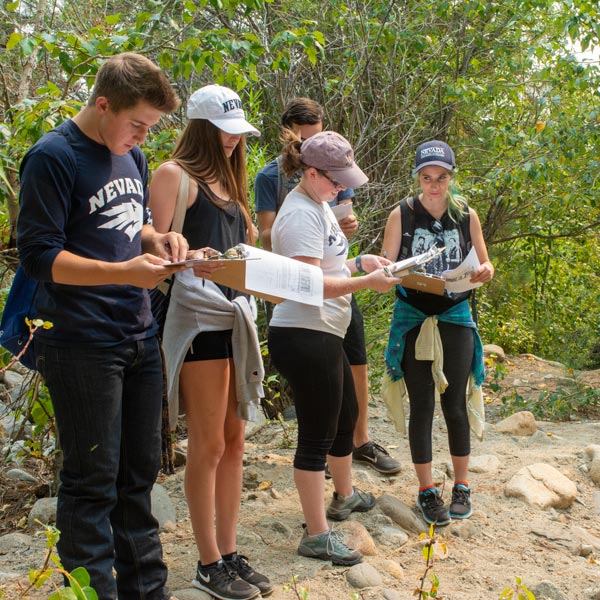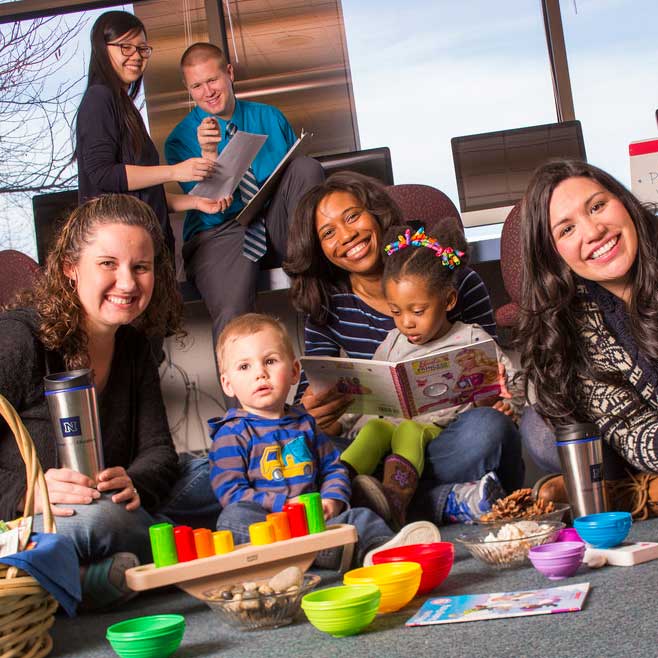In this edition
- Wolf Pack Meats’ new line of jerky and local lamb now available for holidays
- New assistant professor to help expand the College’s Pre-Veterinary Program
- Shedding light on domestic violence: A crucial conversation
- Q&A: Ecologist Tamzen Stringham discusses Nevada’s rangeland
- Newly appointed professors to drive advancements in research
About our College
A founding college of the University, we have a long tradition of excellence in teaching, research and engagement programs that benefit the health and economic vitality of Nevada. We offer programs in:
- agriculture, horticulture, rangeland and veterinary sciences
- biochemistry and molecular biology
- children, youth and families
- community and economic development
- health and nutrition
- natural resources and environmental science
Wolf Pack Meats’ new line of jerky and local lamb now available for holidays
College’s Experiment Station ramping up local offerings
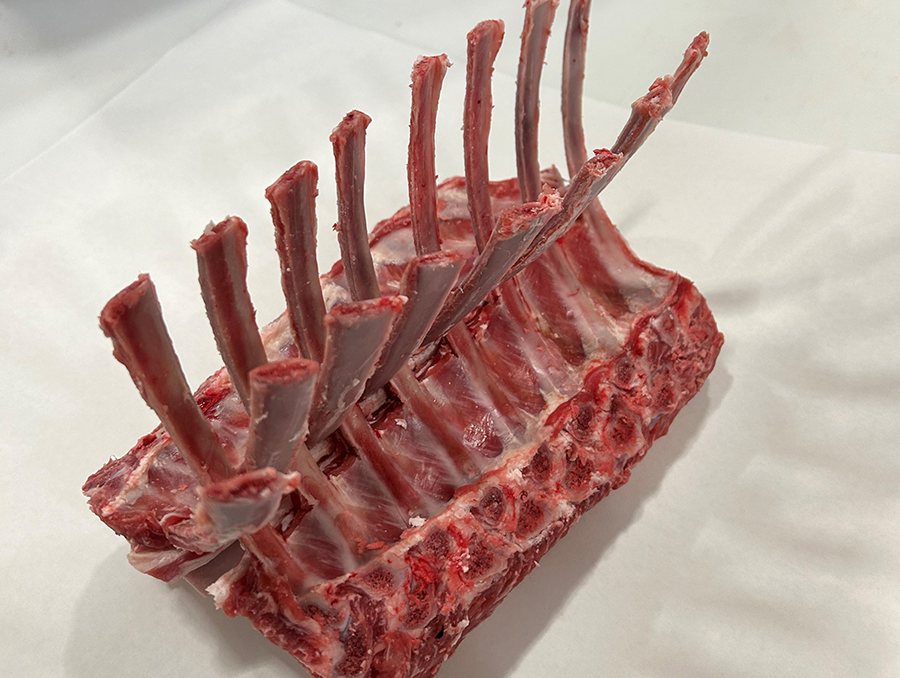
The College’s Wolf Pack Meats has fresh, locally produced rack of lamb in stock, just in time for the holidays.
Just in time for the holidays, Wolf Pack Meats has a new line of locally produced beef jerky and fresh cuts of lamb. The products are part of Wolf Pack Meats’ efforts to enhance its local food offerings for the community, which support the growth of its production capacity, along with its teaching and research missions.
Local lamb
The lamb cuts are from the internationally prized Rafter 7 sheep developed and raised by the College in Eureka and Reno. Local celebrity Master Chef and restauranteur Mark Estee has jumped on board to snatch up some of the meat for his restaurants.
Local jerky
The beef for the jerky was raised here in Reno, at the Experiment Station’s Main Station Field Lab, home of Wolf Pack Meats. Wolf Pack Meats partnered with a local business to make the jerky, which comes in five flavors.
Wolf Pack Meats Operations Manager Tom Kulas said, “It makes a great stocking stuffer or gift for foodies.”
Local beef
Kulas said Wolf Pack Meats is also fully stocked with a variety of beef cuts produced from cattle raised by the College, including filet mignon, New York steak, ground beef, short ribs, beef liver, beef tongue and other items.
Partnering for a robust food community
“Wolf Pack Meats is a key piece to a robust and successful food community here in the region, and we are happy to be partnering with them to buy these local lambs.” – Master Chef Mark Estee
New assistant professor to help expand the College’s Pre-Veterinary Program
Hannah Rodriguez joins the College’s Department of Agriculture, Veterinary & Rangeland Sciences
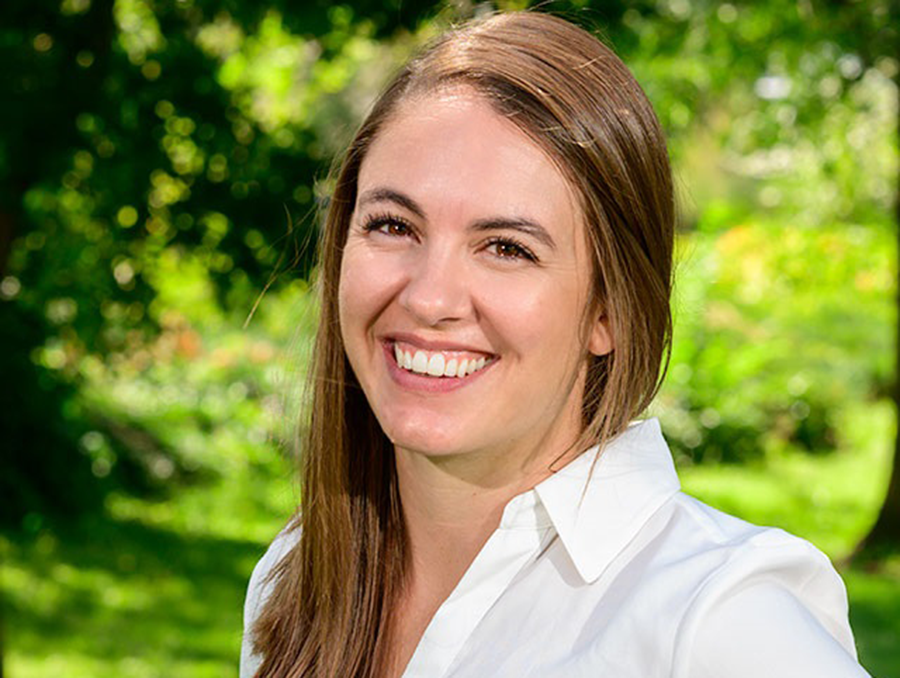
Assistant Professor Hannah Rodriguez joins the College’s Veterinary Science Program as a new assistant professor.
The College recently welcomed Dr. Hannah Rodriguez as assistant professor to its Department of Agriculture, Veterinary & Rangeland Sciences. Rodriguez, a graduate of the College, was selected because of her vast experience, which the College hopes to leverage to help grow its Veterinary Science Program.
Rodriguez grew up raising pigs, sheep and dairy cattle in Extension’s 4-H Youth Development Program, which is offered by the College, as well as with her local Future Farmers of America chapter. She has been a licensed veterinarian of her own practice for over five years and practices on both large and small animals.
The College’s Veterinary Science Program prepares students for careers in veterinary medicine. Nevada has a strong demand for veterinarians, especially to care for large domestic animals in rural areas.
Stimulating an essential workforce
“The veterinary profession is really hurting right now, and we are short on veterinarians across the U.S. So, I hope to stimulate a passion for the profession.” – Dr. Hannah Rodriguez
Shedding light on domestic violence: A crucial conversation
It’s personal, real and closer than you think
Pamela Payne, Clair Thomas, Elizabeth Ornelas and Farrah Stockett

The University’s Hope Team (left to right) Pamela Payne, Clair Thomas, Elizabeth Ornelas and Farrah Stockett, is a collaboration between Extension and the University’s College of Education & Human Development, working to break the cycle of violence in Nevada communities.
Over 10 million people experience domestic violence each year. One in three women and one in four men experience domestic violence, and those numbers are likely much higher.
Domestic violence transcends socioeconomic statuses, cultures and age groups. Often, societal norms, family practices and cultural beliefs mask the severity of domestic violence, pushing it into the shadows.
Debunking myths, understanding the signs and being prepared to take action are paramount. That's why initiatives like the University Hope Team’s 40-Hour Hope Advocacy Training are pivotal. The training, part of a collaboration between Extension and the College of Education & Human Development, helps advocates harness the power of information.
Working to eradicate domestic violence
“To every survivor, we say: You are not alone. Your voice matters. We see you. You matter. To the larger community, we say: We all have a role. We all know someone. Let’s educate ourselves and actively support platforms and programs aimed at eradicating domestic violence. It is a fight we all need to be a part of.” – The Hope Team
Q&A: Ecologist Tamzen Stringham discusses Nevada’s rangeland
A Great Basin expert weighs in on legacy grazing, cheatgrass, and the surprising number of pinyon and juniper trees in Nevada
Amy Alonzo, The Nevada Indepentent
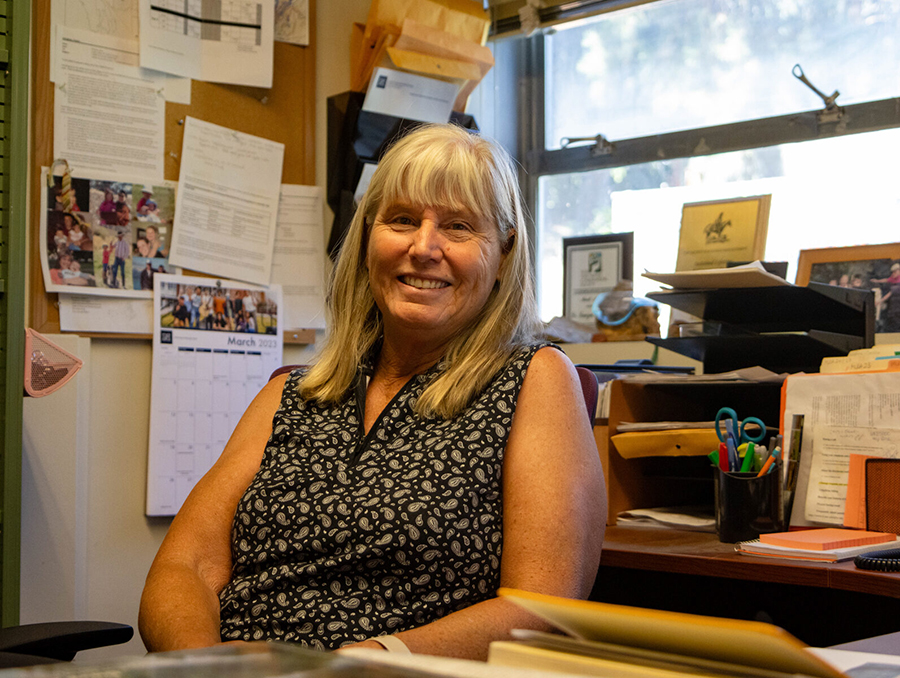
Tamzen Stringham poses for a portrait in her office. Photo by Tim Lenard, The Nevada Independent.
Let’s take a moment to learn a little more about something we all have in common — Nevada, the state we call home — from one of the Great Basin’s leading rangeland biologists.
Tamzen Stringham is a professor in the College’s Department of Agriculture, Veterinary & Rangeland Sciences who has studied Nevada’s rangelands — vast open spaces grazed by wildlife and domestic animals alike — for more than 15 years and the Great Basin for three decades.
Stringham developed her interest in agriculture while growing up on a ranch in California’s Grass Valley and, decades later, her passion for rangeland science and the Great Basin still burns strong.
Serving as a voice for Nevada’s rangelands
“I would like to see more attention on the ecological disaster rangeland fires create. We don’t hear about fires out on rangelands because, either the people who live out there are few and far between, or there are no people out there. And the critters that live on rangelands have no voice.” – Professor Tamzen Stringham
Newly appointed professors to drive advancements in research
Three new faculty members bring new expertise to College’s Department of Biochemistry & Molecular Biology
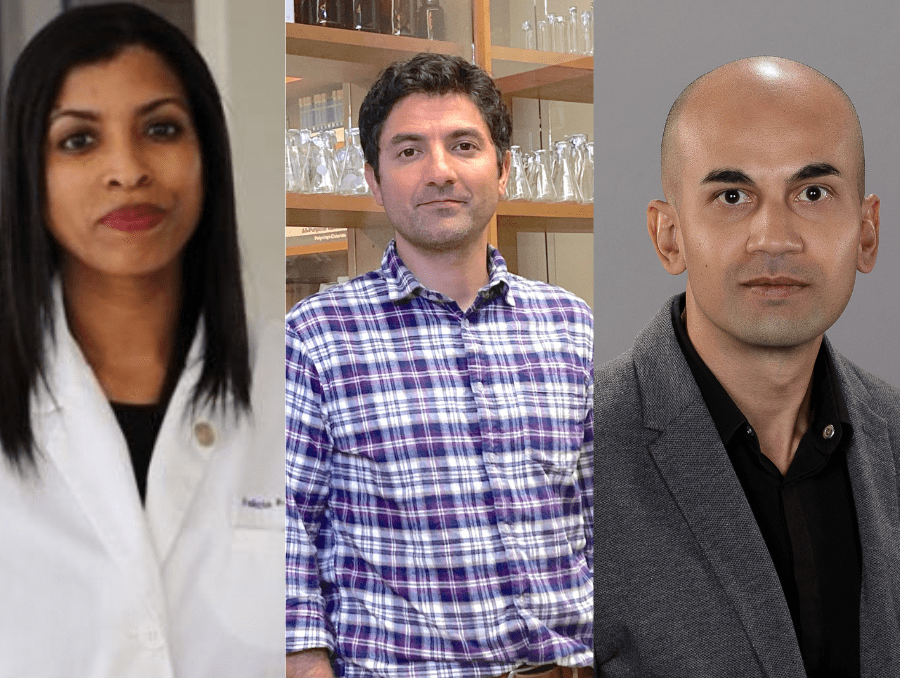
Three new faculty members have joined the Department of Biochemistry & Molecular Biology – (left to right) Felicia Jefferson, Mitchell Omar and Meet Zandawala.
The College has added three new faculty members to its Department of Biochemistry & Molecular Biology this fall. Felicia Jefferson, Mitchell Omar and Meet Zandawala bring unique research expertise and projects that will play a pivotal role in advancing research initiatives in the College and its Experiment Station.
Associate Professor Felicia Jefferson
Jefferson’s research in neuroscience has earned her recognition by the National Science Foundation. She has been awarded more than $1.5 million in competitive research funding for her ongoing research in sleep science and neural engineering.
Assistant Professor Mitchell Omar
Omar’s research primarily focuses on understanding the molecular mechanisms underlying stress hormone production and the formation of tumors and chronically elevated stress hormone levels in patients with Cushing's syndrome.
Assistant Professor Meet Zandawala
Zandawala is a leading invertebrate neuroendocrinologist who uses fruit flies as a model to understand how the small signaling molecules in the brain known as neuropeptides influence animal behavior and physiology.
Advancing teaching and research
"We are thrilled to welcome these three professors to our department. Their expertise and dedication will undoubtedly enrich our academic community and contribute to the advancement of our department's teaching and research mission." – Department Chair Robert Ryan
Innovating for Nevada
Our programs work together to make an impact
Our teaching, research and engagement programs are intertwined and complement one another. Faculty who teach on campus also conduct research as part of our Experiment Station, allowing students to learn about and participate in research. Extension faculty engaging with communities identify research needs, as well as join Experiment Station faculty to conduct research. Faculty on campus help to develop Extension programs in communities.
